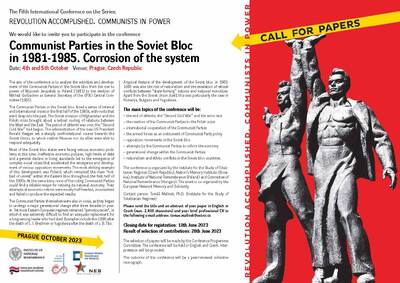We would like to invite you to participate in the conference
“Communist Parties in the Soviet Bloc in 1981–1985. Corrosion of the system”
Date: 4th and 5th October
Venue: Prague, Czech Republic
The aim of the conference is to analyse the activities and development of the Communist Parties in the Soviet bloc from the rise to power of Wojciech Jaruzelski in Poland (1981) to the election of Mikhail Gorbachev as General Secretary of the CPSU Central Committee (1985).
The Communist Parties in the Soviet bloc faced a series of internal and international crises in the first half of the 1980s, with roots that went deep into the past. The Soviet invasion of Afghanistan and the Polish crisis brought about a radical cooling of relations between the West and the East. The period of détente was over, the “Second Cold War” had begun. The administration of the new US President Ronald Reagan set a sharply confrontational course towards the Soviet Union, to which neither Moscow nor its allies were able to respond adequately.
Most of the Soviet bloc states were facing serious economic problems at this time. Ineffective economic policies, high levels of debt and a general decline in living standards led to the emergence of complex social crises that accelerated the emergence and development of various opposition movements. The most striking example of this development was Poland, which remained the main “hot‑ bed of unrest” within the Eastern bloc throughout the first half of the 1980s. At the same time, none of the ruling Communist Parties could find a reliable recipe for reviving its national economy. Their attempts at economic reform were mostly half‑hearted, inconsistent and failed to produce the expected results.
The Communist Parties themselves were also in crisis, as they began to undergo a major generational change after three decades in power. Yet most Eastern European regimes remained “gerontocracies“, in which it was extremely difficult to find an adequate replacement for a long‑serving leader who had died. Examples include the USSR after the death of L. I. Brezhnev or Yugoslavia after the death of J. B. Tito.
A typical feature of the development of the Soviet bloc in 19811985 was also the rise of nationalism and the escalation of ethical conflicts between “state‑forming” nations and national minorities. Apart from the Soviet Union itself, this was particularly the case in Romania, Bulgaria and Yugoslavia.
The main topics of the conference will be:
- the end of détente, the “Second Cold War” and the arms race
- the reaction of the Communist Parties to the Polish crisis – international cooperation of the Communist Parties
- the armed forces as an instrument of Communist Party policy – opposition movements in the Soviet bloc
- attempts by the Communist Parties to reform the economy
- generational change within the Communist Parties
- nationalism and ethnic conflicts in the Soviet bloc countries.
The conference is organized by the Institute for the Study of Totalitarian Regimes (Czech Republic), Nation’s Memory Institute (Slovakia), Institute of National Remembrance (Poland) and Committee of National Remembrance (Hungary). The event is coorganized by the European Network Memory and Solidarity.
Contact person: Tomáš Malínek, Ph.D. (Institute for the Study of Totalitarian Regimes)
Please send the title and an abstract of your paper in English or Czech (max. 2,400 characters) and your brief professional CV to the following e-mail address: tomas.malinek@ustrcr.cz
Closing date for registration: 18th June 2023
Result of selection of contributions: 26th June 2023
The selection of papers will be made by the Conference Programme Committee. The conference will be held in English and Czech. Interpretation will be provided.
The outcome of the conference will be a peer-reviewed collective monograph.
 E-Księgarnia
E-Księgarnia